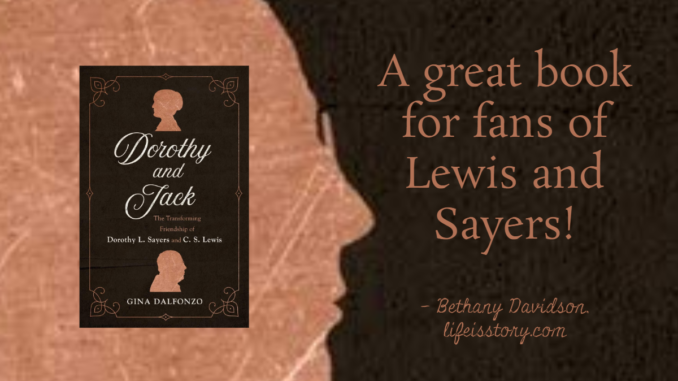
on August 18, 2020
Genres: Non-Fiction, Biography, Christian Life
Buy on Amazon
Goodreads

What happens when we push past the surface and allow real, grounded, mutually challenging, and edifying friendships to develop? We need only look at the little-known friendship between eminent Christian thinkers Dorothy L. Sayers and C. S. Lewis to find out. Born out of a fan letter that celebrated mystery novelist Sayers wrote to Lewis as his star was just beginning to rise, this friendship between a married woman and a longtime bachelor developed over years of correspondence as the two discovered their mutual admiration of each other's writing, thinking, and faith.
In a time when many Christians now aren't even sure that a man and a woman can be "just friends" and remain faithful, Gina Dalfonzo's engaging treatment of the relationship between two of Christianity's most important modern thinkers and writers will resonate deeply with anyone who longs for authentic, soul-stirring friendships that challenge them to grow intellectually and spiritually. Fans of Lewis and Sayers will find here a fascinating addition to their collections.
C.S. Lewis is my favorite writer and historical figure, and I love Dorothy L. Sayers’s mystery novels and Christian nonfiction. As soon as I learned that this book existed, I knew that I wanted to read it, and I enjoyed it very much. I was not previously aware that these authors were friends, and it fascinated me to learn about their unique intellectual and Christian bond. Even though Lewis and Sayers disagreed on various points, such as whether or not art should have an apologetic purpose, they understood and supported each other in ways that no one else could have. The friendship became especially important to Lewis once the Inklings group diminished through interpersonal strain, and even though he and Sayers primarily corresponded through letters, they maintained a vibrant connection until their deaths.
Dorothy and Jack: The Transforming Friendship of Dorothy L. Sayers and C.S. Lewis is full of fascinating information, and I highly recommend it to other Lewis and Sayers fans. I especially appreciate how the author handles the friends’ gender differences, since she is completely fair to Lewis while also showing how Sayers challenged and sharpened his views over time. As Dalfonzo explains, because Lewis lost his mother at a young age and spent his formative years in all-male settings, he faced significant circumstantial limitations in understanding women. She also emphasizes that even though some of his generalized views were culturally conditioned and unbiblical, he treated individual women as his respected equals. I appreciate how deftly she handled this topic, exploring the perspective-changing benefits of cross-gender friendship without scapegoating Lewis or using Sayers as a prop for current ideological trends.
A Model for Friendship?
However, I have two issues with this book that prevent me from rating it five stars. Firstly, Gina Dalfonzo’s writing involves significant speculation. She clearly distinguishes her imagination from documentary evidence, but she often fills in gaps with her own preconceived ideas, eager to defend a personal thesis about cross-gender friendship. I found these asides preachy and distracting, and because Lewis and Sayers had an unusual friendship, she could not fully support her points through them.
Most obviously, since Sayers and Lewis primarily communicated through letters, their friendship cannot serve as an example for men and women who hang out frequently. Also, in addition to avoiding common challenges related to in-person gatherings, these friends did not even discuss personal issues on a regular basis. Their letters focused on theology and literature, and even though they exemplify how male and female intellectuals can sharpen and support one other, this model does not broadly apply to Christians with other personalities and interests.
In one chapter, Dalfonzo quotes Sayers about what a relief it was that she could discuss Dante with Lewis, since her husband had no interest in the subject. Dalfonzo then argues that despite conventional wisdom, it is healthy for someone to turn to an opposite-sex friend to fulfill a companionship need that their spouse cannot meet. This can be true, but she seemed too eager to deny the possibility of risk. There is a world of difference between discussing an intellectual topic with a friend and using “my husband just doesn’t understand!” as an excuse to discuss emotional or intimate topics that ought to stay within a marriage. I wish that the author had approached this from a more nuanced perspective, instead of upholding an intellectual friendship between unusual people as a standard that dismisses very real concerns.
Conclusion
I truly enjoyed this book, and it has many wonderful elements. I enjoyed learning more about both of these authors, and was fascinated to learn about their unique friendship, which was based in their common interests and their similar positions in British society and Christian culture at that time. However, the author’s choice to present Sayers and Lewis as a model for male-female friendship diminished my enjoyment somewhat, since she distracted from the historical narrative with personal opinions and tended to over-generalize their story without a sense of how unique their relationship was. Still, despite these flaws, this is a great book for fans of Lewis and Sayers, and it provides wonderful insight into their personalities, their interests, and the understanding that they found with each other.
